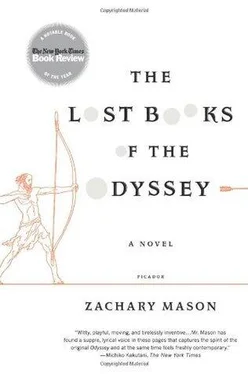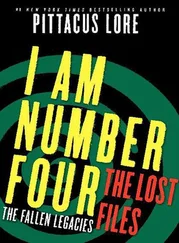In the following days both sides kept to their strongholds and even then they were afraid Achilles would overwhelm them, indifferent as he was both to blows and to entreaty. Peering over their barricades, they saw him walking a slow circuit around the city wall, dragging Patroclus behind him by the heel, occasionally looking back to see if he was stirring.
The Greeks had had enough. Agamemnon fulminated but he could not stop them from breaking camp and taking to their ships. Odysseus was relieved that no one had thought to question him about Achilles’ extraordinary behavior and decided it was time to bring an end to his creation’s career. On a grey morning when the other captains were getting their ships ready for sea, he got a handful of black mud from the banks of the Scamander and went alone to the deserted plain where Achilles made his grisly circuit around Troy (it had been three hot days and Patroclus’s remains were faring poorly). “You there! Come here,” said Odysseus with a confidence he did not feel. “I am here to help. I will make your friend there as alive as you are.” Achilles approached him, all innocence, his burden ploughing the dust behind him. “Give me your helmet,” said Odysseus. As Achilles lifted it off, Odysseus reached up and smeared the mud on his forehead, effacing the word “Life.” Achilles stood there holding his helmet in his hands, as still as any stone.
Odysseus reflected that he hated both sides equally and might as well do both a disservice, so he loaded the inert golem into a cart and drove it to the Trojan gates. To the guards on the walls he shouted, “Achilles, scourge of the plain, is no more — he went mad from grief and flung himself into the sea. He was our best man and we have no more stomach for war. Accept, then, this memento of our strife, a statue of him who was both our strength and our undoing. Take it, if you want it, and put it in your city to honor the man who slew your best but in the end preserved you.” Odysseus walked quickly away as dark clouds rolled in, the rain fell and the mud ran down Achilles’ face in black rivulets.
*An island in the Aegean Sea.
A long time ago someone unknown to me lay on this cooling stone under a fading sky and sensed more than saw the ragged herds of oryx and ibex moving slowly through the bush. The tension in the air grew as the sun sank and the torpid predators pricked up their ears in their trees and lairs, waiting for the plain to be immersed in their medium, the dusk. A lion in silhouette stretched her long spine on the peak of a lone hill overlooking a white beach and the sea, a defensible spot, a good place for a city.
A long time from now someone unknown to me will stand on the white plain where I now stand. He will speak a different language and the mountains in the distance may have been ground down but there are certain constants that will reliably inform his life — kings like great trees whose roots are watered in ignorance, men who come to war reluctantly only to discover they have the souls of jackals, and fortresses like mountains, as immovable and inevitable. I anticipate that a flash of intuition will make him look at the tumulus or crater or clamorous sprawling city where Troy once stood and intuit how many men once bent their minds toward its destruction.
These strangers used and will use their wits to understand the world as far as they are able, though that was and will not be very far, and they did not and will not know where they come from nor who they are. Their ignorance, I infer, also encompasses the true names of the stars, the language of birds, and the key to the circuitous and ever-present defences of Troy. How can it be that I, enjoying the greatest advantage, the only advantage, of living in the present, am just as ignorant?
Circe had told me that the sirens’ song was irresistible, the very shape of desire, and that no one who heard it went unscathed, as was attested by the bones of their admirers tumbling back and forth in the tide-pools around their reef. But I have never been one to leave a riddle unsolved or, as I overheard my men say, well enough alone and I was determined to hear them for myself.
It seemed that my curiosity could be safely indulged through simple logistics. As the ship neared the sirens’ rock I had myself bound to the mast while the crew stuffed their ears with beeswax. It seemed odd no one had thought of it before but in general there is no accounting for the bovine stupidity of mankind.
There were two of them. As we approached the white breakers around the reef I saw them sit up, stretch their long spines and fix us with their gazes. Their torsos were too long, their fingers had too many joints and their eyes were cold and green. One said something to the other in a high musical language and my eyes began to water — the other laughed and they began to sing.
As they sang I remembered the face of a Trojan whose name I never knew whom I had killed before the high walls of that city, the man’s surprise as I attacked him blind-side, how easy it was to slip my point past his guard and run him through, the Trojan’s dawning rage at the affront to his body, an emotion half formed on his face when death found him, the tug on my blade as his body fell away. I remembered the first time I saw Penelope, walking away from me in a white courtyard in Sparta. I remembered Ithaca the day I left it. I saw how far I was from home, how remote the chance I would ever see it again. The sirens beckoned, longing for me, offering release from my displacement, but I laughed with delight at being lost and reckless, wandering among unknown islands, not knowing the shape of my days. “This is not so bad,” I said to myself. “Anyone unmanned by these monsters is a home-body or a sentimentalist.”
The sirens, who had been watching me intently, fell silent, briefly nonplussed. They conferred in low voices and I thought they might have given up when they launched into a new song, an intricate counterpoint comprised of just a few themes, varied and interwoven.
Their song broke over me and it was as though a veil had been blown away. I saw how Achilles, whose humanity was subsumed in speed and strength and reckless pride, had made his inevitable slow march toward death, dragging Agamemnon and Patroclus and all the Greeks and the royal house of Troy stumbling behind him. I saw the implacable self-assertion of Agamemnon mirrored in pious, gentle Priam’s refusal to save his city. *I saw Hector’s love of country and family opposed by Achilles’ madness for glory and his slight impatience for the death he knew was closing in on him. And overlaying them all were the passions and rivalries of the bright gods, like scirocco winds scouring everything they touched. Finally I saw myself, how my wit exceeded that of other men but gave me no leverage against fate, and how in the time to come it would avail me nothing but possibly an understanding of the full scope of my helplessness.
As their song crescendoed I had the sudden conviction that the world, which I had considered the province of meaningless chances, a mad dance of atoms, was as orderly as the hexagons in the honeycombs I had just crushed into wax and that behind everything, from Helen’s weaving to Circe’s mountain to Scylla’s death, was a subtle pattern, an order of the most compelling lucidity, but hidden from me, a code I could never crack.
Abruptly, the song ended and I sagged forward, the ropes digging into my chest as the men took the ship out. I cried out for the sirens to continue, that I was close to an answer, but they watched me depart with their chins propped on their hands.
I tried to reconstruct their song while its echoes yet lingered in my mind but all I could remember were four lines:
Читать дальше












